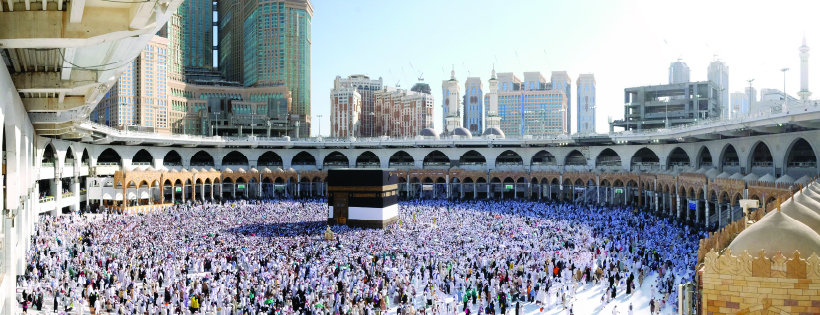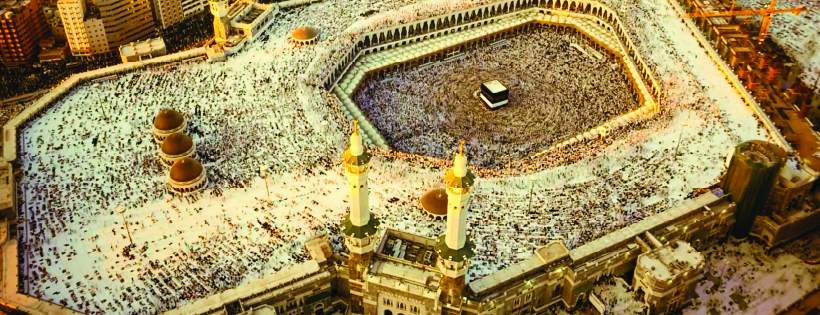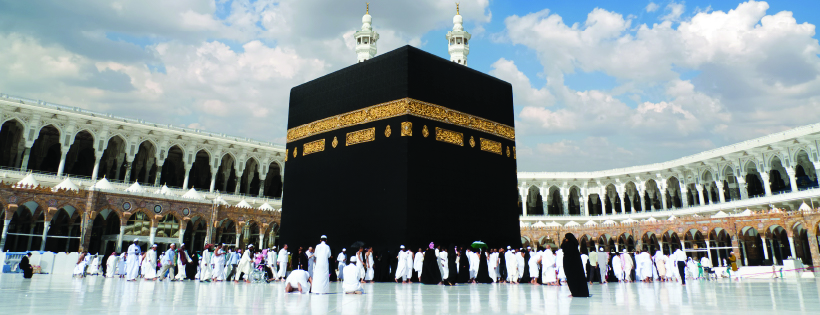Introduction
A recent update by the Saudi Arabian Ministry of Health reveals Vaccination as one of the critical health requirements for participation in the Hajj to reduce and control infectious and respiratory diseases among participants.
What is Hajj?
Hajj is the annual pilgrimage to Mecca’s Islamic holy city in Saudi Arabia, usually in July. It is a once-in-a-lifetime obligation for members of the Islamic faith. According to Islamic teachings, the Hajj is one of the five pillars of Islam and should be treated with utmost reverence; it is a journey of great significance.
The Islamic teachings reveal that the Hajj signifies the Muslim solidarity and reverence for God (Allah). Participating in the Hajj is mandatory for every adult Muslim, following their faith at least once in a lifetime. Muslims are strongly advised to ensure they are in good health and financially able to support themselves and their family during the holy pilgrimage. Umrah, popularly described as a lesser subsequent pilgrimage to Mecca, cannot be substituted for the Hajj.

When does the Hajj occur, and for how long?
The Hajj occurs yearly, during the Islamic calendar’s last month. The pilgrimage rites run for about six days. However, most people are not familiar with calculating the Islamic calendar other than the Imam and other Islamic elites. This is why it has been simplified to a Gregorian calendar equivalent.
Interestingly, the date for Hajj following the Gregorian calendar changes every year because the Islamic calendar, a lunar calendar, is shorter than the Gregorian calendar by about eleven days. For 2022, the Hajj will run from 7th July to 12th July, evening to evening.
Travel Plans for Hajj—what you should know
Two to three million people make the Hajj annually, with attendees coming from all parts of the world, according to the U.S. Department of State and Bureau of Consular Affairs. Detailed travel plans are crucial to surviving the journey.
As part of your travel plans, you are free to make your own arrangement for essentials like a travel package, hotel reservations, and flight. Alternatively, you can have your trip planned by a travel agent. In either case, all travel plans and arrangements must be through agents or agencies approved by the Saudi Arabian government. It will be easier to gain entry, transportation, and accommodations within Saudi Arabia. Using an authorized travel agent helps you avoid immigration pitfalls that could make your journey problematic with heavy fines, deportation, imprisonment, and a possible ban from attending future events within the country.
Key Destinations on a Hajj Itinerary
Participating in the Hajj is a religious obligation, but it also has specific historical, cultural, and social dimensions. There are several vital destinations you should not miss when creating your Hajj itinerary. These key destinations will be sufficient for both Hajj and Umrah journeys.
Here is a brief list explaining these cities and what makes them significant for every Pilgrim.

Mina
Mina is perhaps the first city every Pilgrim visits during the Hajj because the journey begins in Mecca, where the pilgrims spend most of their nights. It is a valley located eight kilometers to the east of Masjid al-Haram and contains about 100,000 tents that serve as temporary accommodations for the pilgrims.
Interestingly, Mina is generally known as “the city of tents.” A visit to Mina is significant for the Muslim faithful as it commemorates the historical event of Prophet Muhammad stoning the devil who tried to come between him and the commands of Allah. The Muslim faithful reenact this ritual by stoning the devil from the third to the fifth day of the Hajj.
Masjid al-Haram
Masjid al-Haram is where the Kaaba is located. The Kaaba is what the Muslim faithful know as “the house of Allah,” It is immensely significant to Pilgrims. It has the sacred black stone from paradise and important holy places like the Safa, Marwah, and Maqam Ibrahim. Muslim faithful on pilgrimage at the Hajj generally want to touch and kiss the floor of Masjid al-Haram to show their reverence for the holy place.
Muzdalifah
Lies between the city of tents—Mina, and Mount Arafat, is Muzdalifha, where the pilgrims stay till sunset after making the 10 kilometers walk from mount Arafat.
Mount Arafat
According to the Islamic code for pilgrims, one’s participation in the Hajj can be invalid by not visiting Mount Arafat. It is significant for being where the Prophet Mohammad delivered his final sermon.
The mountain measures about 230 feet high and serves as the Hajj sermon ground for pilgrims, usually on the 9th Zil hajj. Additionally, Muslims collect pebbles here for the ritual of stoning the devil from the 10th Zil hajj.
Cave of Hira
The Cave of Hira is historically significant as the place where the Prophet Mohammad used to visit for his meditations during the first 40 years of his life and where he received his first revelation. The cave is 5 kilometers from Masjid al-Haram and takes approximately 45 minutes to climb to its summit.
Cave of Thawr
The Cave of Thawr is iconic for being the historical place where the Prophet with Hazrat Abu Bakar spent three days and three nights migrating from Mecca to Medina. It takes approximately an hour and 30 minutes to reach the cave, climbing upwards. It is recorded in Islamic history that this cave was home to poisonous snakes, one of which bit Hazrat Abu Bakar before he was cured by the Prophet Muhammad’s saliva.
Critical considerations for planning Hajj
The activities during the Hajj are physically demanding and require some degree of physical fitness to cope with the demands. The top recommendation from Hajj officials is that you refrain from attending or postpone your participation in the Hajj or Umrah if you have any of the following conditions:
Conditions for not participating:
- If you are pregnant
- Over 65 years
- Under 12 years
- If you have a medical condition like heart, kidney, or lung problems
- If you have a life-threatening illness, perhaps cancer
- If you are immunocompromised
Possible risks during the Hajj
The Hajj is an iconic event that gathers a tremendous crowd annually. There is the potential for overcrowding and the spread of infectious diseases. There is also the risk of a stampede, especially during the stoning rituals.
It is essential to be aware of the risks you could face when you travel for the Hajj and take the necessary precautions. Here is a list of some risks pilgrims face during the Hajj. They include but are not limited to:
- Respiratory diseases
- Overcrowding
- Stampede crisis
- Dehydration
- Bacterial infections
- Viral infections
- Property theft
- Heatstroke
- Yellow fever
- Japanese encephalitis
- Food poisoning
- Waterborne illness
- Meningococcal meningitis
- COVID, etc.
Preventive measures for your trip
A significant proportion of Hajj risk is health-related. Vaccination is a crucial precautionary measure for protection against health-related risks during Hajj. The Saudi Arabian Ministry of Health’s requirements for vaccines are essential to gain an entry visa from outside the Saudi Arabian kingdom for participation in the Hajj.
Where can you get the vaccines?
You can obtain these vaccines at Swift Clinics. These vaccines are available in major cities in the Greater Toronto Area (GTA) and London, Ottawa and Kingston. Here are the locations for obtaining essential vaccines for Hajj:
- Brampton
- Etobicoke
- Milton
- Scarborough
- London
- Kingston
- Ottawa
Here is a list of the essential vaccines you should obtain before planning to make the long holy journey. They include but are not limited to:
Yellow fever vaccine
You will need an up-to-date yellow fever vaccination card or certificate in line with the 2005 international health regulation, especially if you are from any yellow fever-affected country. At least ten days before arrival and at most ten years, a yellow fever vaccination is mandatory.
Meningococcal meningitis
An ACYW-135 vaccine card or certificate of not less than ten days and not more than three years before arrival is required (against A, C, Y–strains, and W-135). Everyone, including children above two years, is required to be vaccinated.
Additionally, pilgrim visitors from African countries affected by meningitis require additional antibiotics like ciprofloxacin 500 mg as a chemoprophylactic measure. Usually, antibiotics are administered at the border to reduce the number of carriers.
Residents of Saudi Arabia who want to participate in the Hajj are not exempted from the vaccination scrutiny, including Hajj officials.
Poliomyelitis
Travelers from polio-endemic locations require polio vaccination proof at least six weeks before leaving their residence locations. In addition, the Hajj visitors will receive a single dose of the oral polio vaccine (POV) upon arrival at the Saudi Arabian border to curb the spread or transmission of the infection.
Seasonal Influenza
According to the recommendation by the Saudi Ministry of Health, visitors from outside the Saudi Arabian kingdom require Vaccination against seasonal influenza before gaining entry, especially vulnerable groups like pregnant women, children, and immunocompromised.
Pilgrims within the Saudi Arabian kingdom are not exempted from vaccination against seasonal influenza, especially Hajj officials.
Pre-travel requirements:
Traveling for Hajj is a long journey away from home. You need to be fully prepared before making the trip. Here are the essential items you need to have before you travel:
Travel insurance
Travel insurance is essential to protect you against the risks associated with the Hajj. Several governments have included the approval of travel insurance for pilgrims’ visas to increase your protection.
General fitness and training
Participating in the Hajj puts your body under severe physical and mental strain. Your overall fitness is a crucial requirement for participating in the Hajj. Those with health challenges are advised to sit out participation or postpone their travel.
Essential medications and supplies
Pilgrims are also expected to pack their own essential medications and a first aid kit. Although a medical team is usually present among the Hajj officials, it is best to come with your own. The availability of essential supplies could be low due to the number of people.
In addition to medications, food supplies are critically important to pack in your bag. According to information published on the Saudi Arabian embassy website, only canned and properly sealed food for one person is allowed. Fresh food is highly prohibited to minimize the proliferation of foodborne illnesses.
How can you ensure your safety, security, and comfort during the Hajj?
Hajj officials do what they can to ensure everyone’s safety and security, but attending to your own personal security cannot be overemphasized. Every pilgrim must take measures to secure themselves and ensure they have what they need for the duration of the Hajj.
Some critical steps you can take to ensure your safety and comfort include but are not limited to:
- Carrying hydration packs to prevent dehydration; it’s usually hot in Saudi Arabia
- Wearing comfortable shoes and clothing
- Maintaining personal hygiene, especially hand washing
- Only taking what you need for the day and keeping other valuables in your hotel room to prevent theft
- Complying with all rules and regulations during the Hajj
Post-travel care
After returning from a successful Hajj experience, you should see a doctor for any concerns and get a comprehensive medical checkup. Your body has been through a lot due to changes in the environment and living conditions. Your healthcare provider can assist you in readjusting after a successful Hajj trip.
In Conclusion
You can get all of the recommended vaccines for Hajj at Swift Clinics, located in the GTA, Ottawa, Kingston and London. Swift Clinics also offer vaccines for yellow fever, meningococcal meningitis, poliomyelitis, and seasonal influenza, among others.
All travelers for Hajj must verify and be updated on the latest guidelines, rules, restrictions, and recommendations before applying to travel. You can get further information from your government’s immigration portal and agencies on state travel laws.
